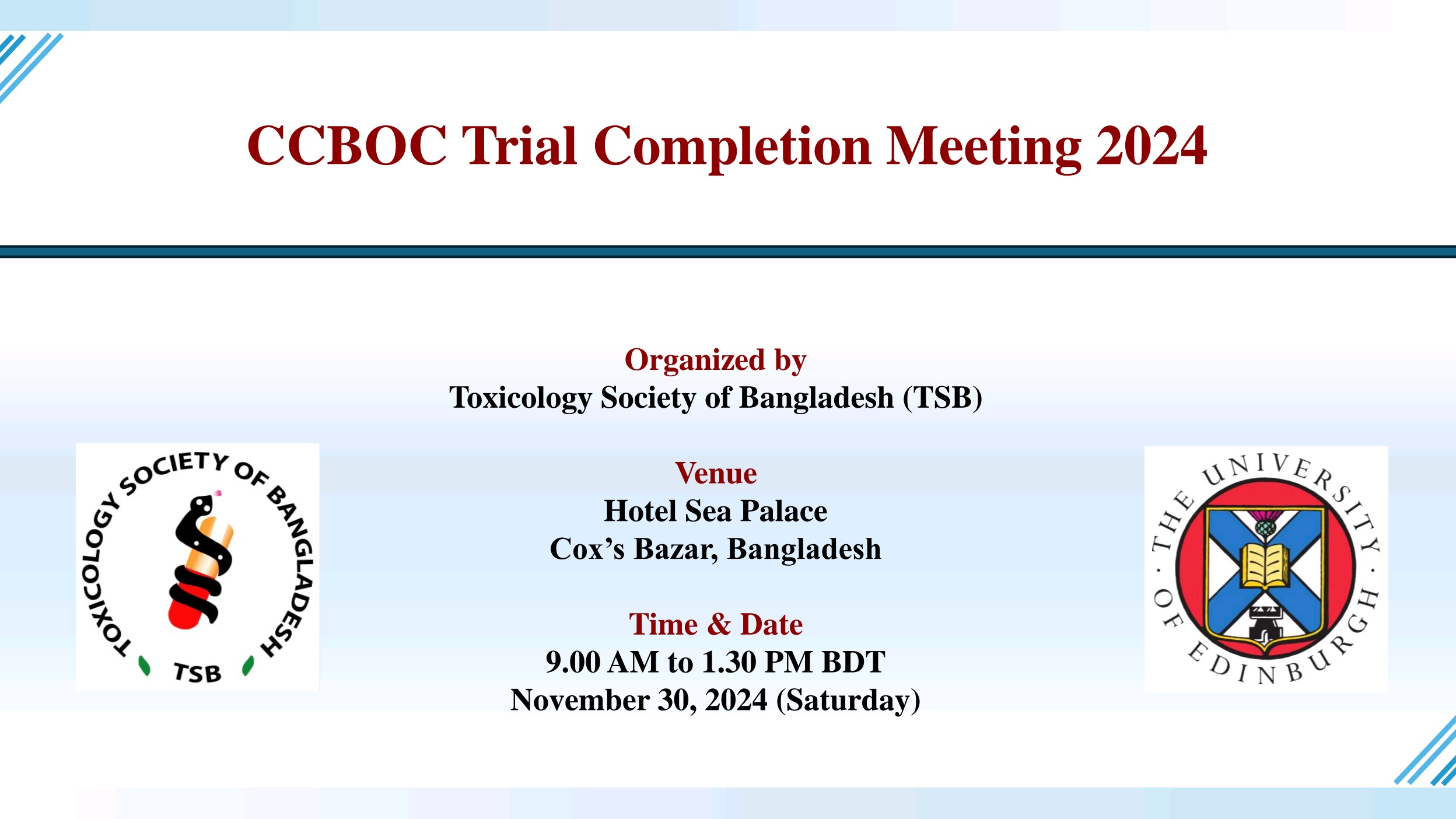CCBOC Trial Completion Meeting 2024

The CCBOC Trial Completion Meeting was held on 30th November, 2024 at the Hotel Sea Palace, Cox's Bazar, Bangladesh. The meeting commenced at 09:00 AM BDT, led by Prof. M Abul Faiz, who welcomed everyone and expressed gratitude for their dedication and hard work throughout the study.
Prof. M Abul Faiz opened the meeting by recognizing the commitment of the research team, despite the trial needing to be closed prematurely. He noted that sufficient data had been collected to answer the research question, which led to the decision to halt the trial. Among those present were esteemed professionals such as Prof Md Sayedur Rahman, Prof Michael Eddleston, Prof Md Robed Amin, Prof Aniruddha Ghose, Dr Fazle Rabbi Chowdhury, Dr Suvodip Shaw, all of whom played vital roles in the study.
During the discussion, Prof. M. Abul Faiz raised questions about the futility of the trial, to which Prof. Michael explained the Data Monitoring Committee's decision and the statistical rationale behind the discontinuation. Both professors shared valuable insights on the trial's design, analysis, and implications for future research.
Dr. Suvodip Shaw presented a comprehensive summary of the CCBOC trial, which involved 1,728 patients from nine different sites. The trial examined the effectiveness of Magnesium Sulfate, Nimodipine, and other treatments, recording 411 adverse events and 68 protocol deviations. A notable achievement was reaching the milestone of enrolling 1,000 patients by February 2023. However, the trial was stopped in April 2024 after a futility analysis revealed that the control group had better outcomes, with a mortality rate of 7.4%.
Despite the challenges posed by the pandemic, the trial was commended for its robust recruitment and data management practices. Dr. Shaw emphasized that the groundwork laid by this trial would facilitate future research initiatives in Bangladesh and beyond.
During the discussion, Prof. M. Abul Faiz, Prof. Michael, Dr. Suvodip Shaw, and Dr. Fazle Rabbi shared important insights about the progress and challenges of the CCBOC trial. This collaborative effort has not only deepened our understanding of critical health issues but has also paved the way for future clinical trials in Bangladesh.
Prof. M. Abul Faiz and Prof. Michael Eddleston discussed the trial's futility, explaining the reasons behind the Data Monitoring Committee's decision. Each study site shared updates on patient enrollments, adverse events, and significant challenges encountered during the trial, encouraging an open dialogue about the research process. The laboratory team also provided updates on ongoing analyses, including the types of pesticides and concentrations of the investigational medicinal product (IMP), emphasizing the need for continued research in this field.
They discussed various aspects of the trial, including laboratory findings and the obstacles faced along the way. Prof. Michael emphasized the significance of the CCBOC trial as a valuable resource for Bangladesh, highlighting its potential to produce essential evidence that can benefit the population. He expressed optimism about the ongoing contributions of the research team to clinical research, which are crucial for enhancing healthcare outcomes.
Prof. Michael highlighted the trial's importance for Bangladesh, pointing out its potential to guide future clinical trials and provide essential evidence for the population. He reassured participants that there was no evidence of harm from the treatments, specifically magnesium sulfate and nimodipine, which were administered within safe limits. The decision to halt the trial was based on futility—indicating that the control group had better outcomes—not due to safety concerns.
Looking ahead, Prof. Michael outlined the next steps for the trial. The database will soon be closed, and the data will be passed on to statisticians for detailed analysis. A comprehensive report is expected soon, detailing primary outcomes such as hospital mortality and discharge statuses, along with secondary outcomes like home deaths and types of poisoning.
Despite the trial's negative results, Prof. Michael remains hopeful that the findings will still provide valuable contributions to the scientific community. Plans are underway to submit the results to The Lancet, a prestigious medical journal, ensuring that the insights gained from this research reach a broader audience.
The discussion also opens the door for future research opportunities. Dr. M. Abul Faiz and Dr. Fazle Rabbi provided insightful suggestions, urging the team to consider smaller case series, such as studies on phenythrofiol. These focused studies could result in significant publications and further enhance the clinical research landscape in the region.
Prof. M Abul Faiz expressed his gratitude to the entire research team for their steadfast commitment during the trial. He recognized the difficulties encountered, especially the early termination, but highlighted that the data and infrastructure established during the study would be an important asset for future research in Bangladesh and beyond.
